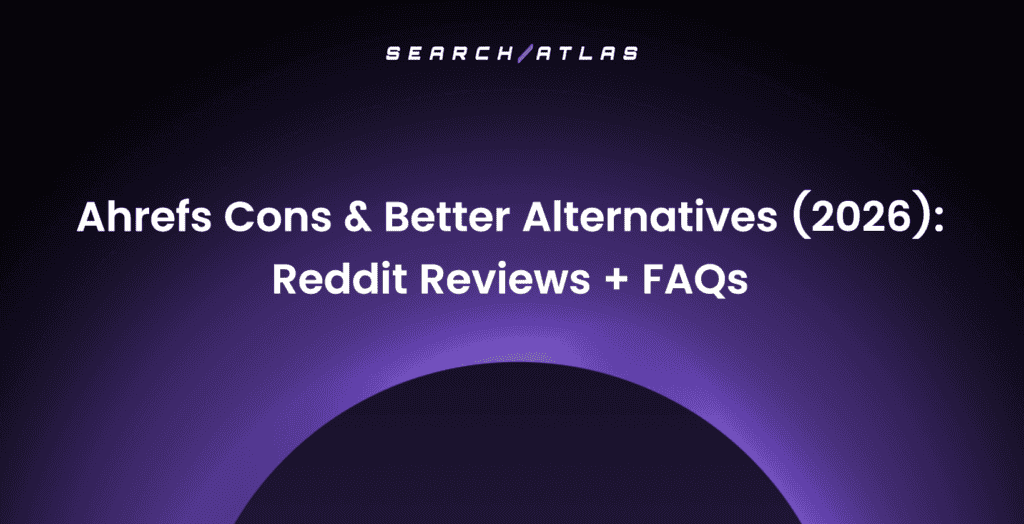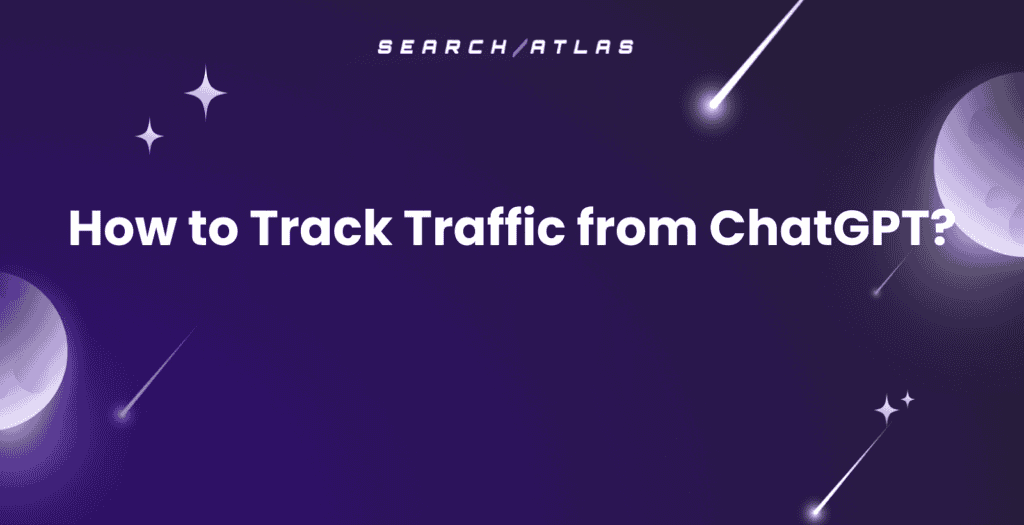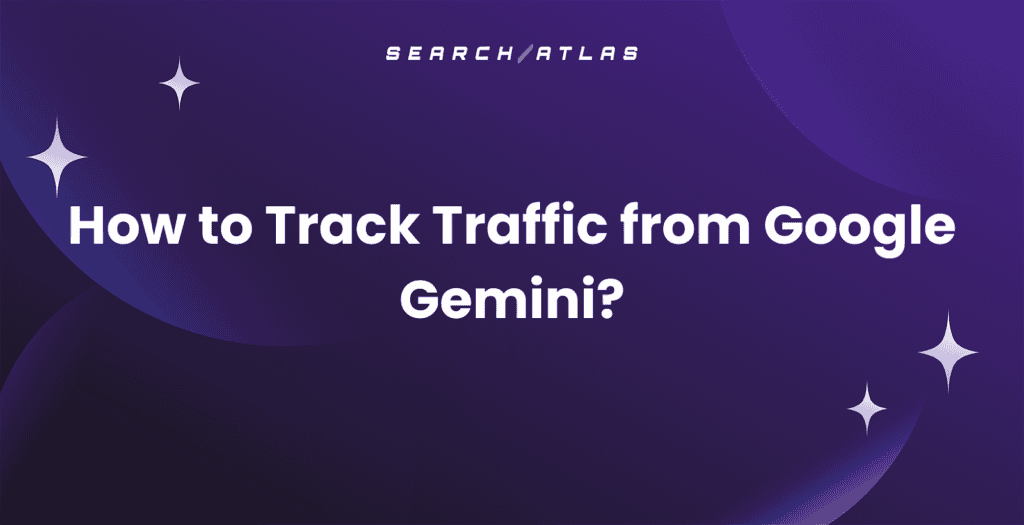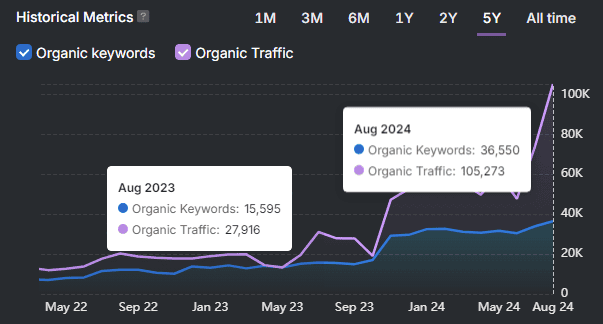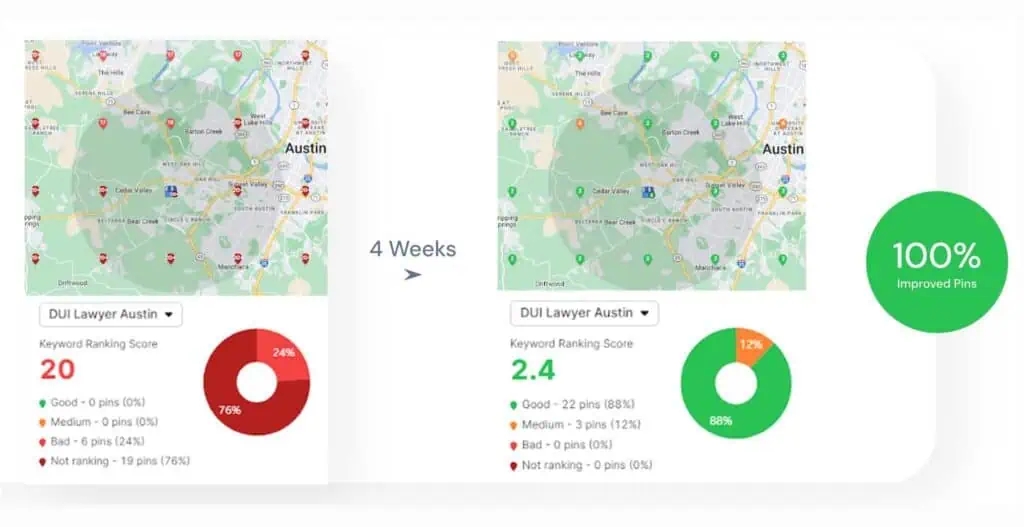SEO outsourcing refers to the process where a business delegates search engine optimization tasks to external professionals, freelancers, or agencies. Search engine optimization outsourcing includes keyword research, on-page optimization, content writing, link building, technical SEO, and local SEO. External teams manage SEO activities that internal employees or departments do not handle directly.
SEO outsourcing allows businesses to improve organic visibility, reduce operational costs, and access specialized expertise without hiring in-house teams. Companies outsource SEO to agencies that work on multiple websites across verticals, which brings broader experience and process efficiency. The best practices for outsourcing SEO include defining clear goals, choosing the right outsourcing model, and evaluating provider portfolios.
What Is SEO Outsourcing?
SEO outsourcing is the strategic delegation of search engine optimization activities to external service providers who specialize in website visibility and organic search performance. SEO outsourcing involves transferring SEO responsibilities from internal teams to freelancers, agencies, or white-label partners who possess the expertise, tools, and resources to execute comprehensive optimization strategies.
Outsourcing search engine optimization covers tasks that require adaptation to search engine algorithm updates and platform-specific ranking signals. Businesses outsource SEO because in-house teams often lack the time, tools, or training to achieve results at scale.
Providers who offer outsourced SEO services follow fixed scopes, performance metrics, and regular reporting schedules. Most use proprietary tools or licensed platforms to conduct audits, track keywords, analyze backlinks, and optimize content. Outsourcing SEO improves agility, especially for startups, e-commerce brands, and agencies that serve multiple clients.
What Is the Importance of SEO Outsourcing?
The importance of SEO outsourcing lies in the operational, financial, and performance-based advantages that support growth and efficiency. Companies outsource SEO services to meet campaign goals without expanding internal teams.
Outsourcing SEO improves time-to-results and ensures that SEO execution aligns with industry standards. Service providers monitor ranking shifts, test new strategies, and apply scalable frameworks that internal teams cannot always support. Businesses that outsource SEO services reduce operational risks, avoid hiring delays, and reallocate internal resources toward product, sales, or design.
Cost efficiency represents a primary driver for SEO outsourcing decisions for many businesses. Companies save on salaries, benefits, training, and tool subscriptions by partnering with external providers. A full-time SEO specialist costs $50,000-$80,000 annually, while outsourced services provide flexible pricing based on actual needs.
How to Do SEO Outsourcing?
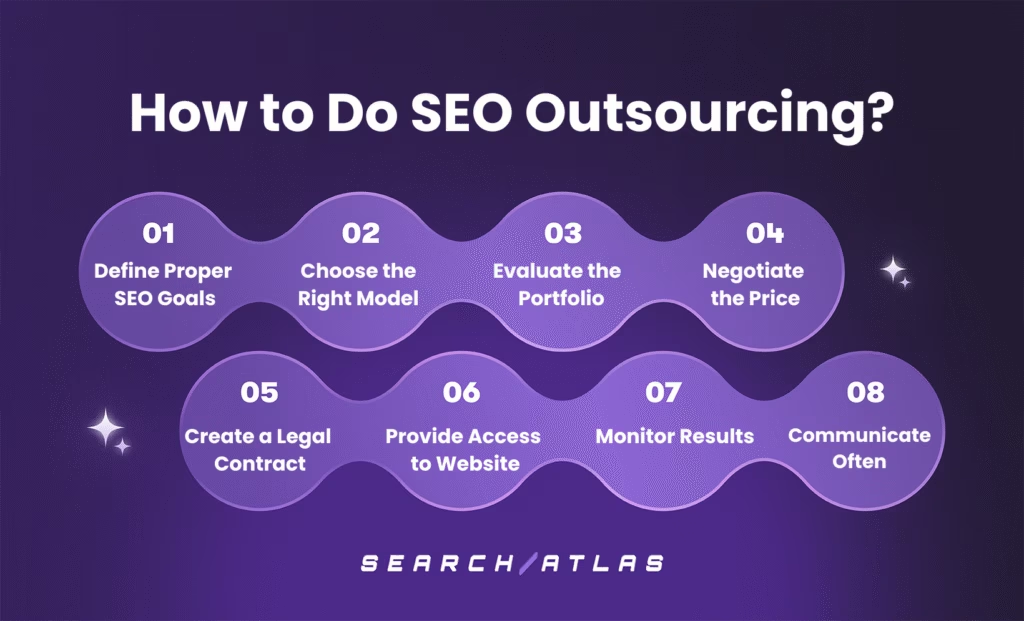
To do SEO outsourcing, you need a structured process that covers goal setting, provider selection, legal setup, and performance tracking. SEO project outsourcing involves eight important steps that maximize success and minimize risks.
The 8 best practices for SEO outsourcing are listed below.
1. Define Proper SEO Goals
Defining proper SEO goals establishes the framework for successful SEO outsourcing relationships.
Goal definition starts with identifying specific business outcomes you want to achieve through SEO. Specific SEO goals include increasing organic traffic by specific percentages, improving rankings for target keywords, generating qualified leads, or enhancing brand visibility in search results. Quantifiable metrics enable objective performance evaluation and accountability.
The best practices for defining SEO outsourcing goals are listed below.
- Set SMART objectives (Specific, Measurable, Achievable, Relevant, Time-bound) for each campaign phase.
- Identify primary KPIs such as organic traffic growth, keyword rankings, conversion rates, and ROI.
- Establish baseline metrics before outsourcing begins to measure improvement accurately.
- Create milestone checkpoints for reviewing progress and adjusting strategies.
- Document expectations regarding communication frequency, reporting formats, and deliverable timelines.
Clear SEO goals create alignment between the business and the SEO outsourcing provider.
2. Choose the Right Outsourcing Model
Choosing the right outsourcing model determines the structure, cost, and outcomes of your SEO partnership. Different outsourcing models suit various business needs, budgets, and growth stages.
The three primary SEO outsourcing models offer distinct advantages based on your requirements. The three main SEO outsourcing models are hiring freelancers, digital agencies, or white-label SEO partners.
- Freelance SEO consultants provide specialized expertise for specific projects or ongoing consultations.
- Digital agencies deliver comprehensive services with team-based approaches and diverse skill sets.
- White-label SEO partners offer re-brandable services ideal for agencies or businesses that want to expand service offerings.
Freelance SEO consultants work best for small businesses or specific optimization needs. They offer personalized attention, flexible pricing, and direct communication. However, freelancers have limited capacity and may lack resources for large-scale campaigns.
Digital agencies provide full-service solutions with dedicated teams, advanced tools, and proven processes. They handle complete SEO strategies from technical audits to content creation and link building. Agency partnerships suit businesses seeking comprehensive optimization without the internal management overhead.
White-label SEO providers specialize in delivering SEO services under your brand name. White-label SEO services benefit agencies that want to expand offerings without building internal teams. White-label partners handle execution while you maintain client relationships and project management.
3. Evaluate SEO Provider Portfolio
Evaluating SEO provider portfolios reveals provider SEO capabilities, industry experience, and result-generation potential. Portfolio assessment examines specific achievements, methodologies, and client satisfaction.
Portfolio evaluation focuses on relevant industry experience and demonstrable results. Look for providers who have succeeded with businesses similar to yours in size, industry, and target market. Request specific examples showing ranking improvements, traffic growth, and business impact metrics.
The primary elements to assess in SEO portfolios are listed below.
- Client case studies with before-and-after metrics that show tangible improvements.
- Industry expertise demonstrated through relevant client examples and specialized knowledge.
- Service scope examples illustrate capability across technical SEO, content, and link building.
- Client testimonials and references that provide third-party validation of results.
- Longevity of client relationships that indicates satisfaction and sustained performance.
- Transparency in reporting methodologies and result attribution.
Use the Search Atlas Site Explorer Tool to verify claimed results by analyzing the domain power, backlink profiles, and organic traffic patterns of their client websites. The Search Atlas Site Explorer Tool reveals actual SEO performance metrics that validate or challenge portfolio claims.
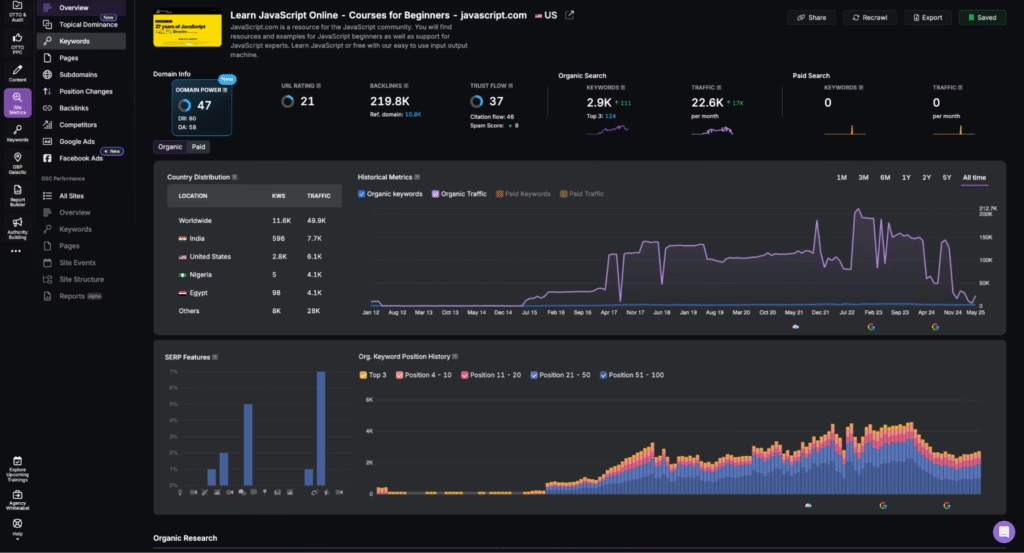
4. Negotiate the Price
Negotiating prices requires understanding market rates, service inclusions, and value propositions to secure fair agreements that align with your budget and objectives. Price negotiations should focus on value instead of seeking the lowest cost.
SEO outsourcing pricing varies significantly based on provider type, service scope, and market positioning. Freelancers typically charge $50-$150 hourly or $500-$5,000 monthly for ongoing services. Agencies range from $1,000-$10,000+ monthly, depending on comprehensiveness. White-label providers offer wholesale rates typically 30-50% below retail agency pricing.
Effective price negotiation strategies are outlined below.
- Request detailed breakdowns of services included in the proposed pricing.
- Compare multiple proposals to understand market rates for your requirements.
- Negotiate performance-based components linking payment to specific outcomes.
- Clarify what happens if results fall short of agreed targets.
- Discuss scaling options for increasing or decreasing service levels.
- Ensure transparency regarding additional costs for tools, content, or link building.
5. Create a Legal Contract
Creating a contract secures intellectual property, brand assets, and performance obligations. Creating a legal contract protects both parties by documenting agreements, responsibilities, and recourse mechanisms. Professional contracts prevent misunderstandings and provide frameworks for resolving disputes.
Legal agreements should clearly define deliverables, timelines, payment terms, and intellectual property rights. Include provisions for confidentiality, non-compete clauses where appropriate, and dispute resolution procedures.
The basic SEO outsourcing contract components are below.
- Detailed service scope with specific deliverables and exclusions.
- Performance metrics and measurement methodologies.
- Payment schedules, terms, and late payment penalties.
- Intellectual property ownership for created content and strategies.
- Confidentiality agreements protecting business information.
- Termination clauses with notice periods and transition procedures.
- Liability limitations and indemnification provisions.
6. Provide Access to the Website
Providing access means sharing CMS, Google tools, and SEO platform credentials with limited permissions.
Providing website access enables SEO providers to conduct audits, implement optimizations, and monitor performance. Access provision requires balancing security with operational necessity. Access levels should match service requirements without compromising security.
Access provision best practices for SEO outsourcing are listed below.
- Create dedicated user accounts rather than sharing personal credentials.
- Grant the minimum necessary permissions for each platform.
- Document all access provided with timestamps and permission levels.
- Implement monitoring for unusual activity or unauthorized changes.
- Establish protocols for revoking access upon contract termination.
- Maintain audit trails of all changes made by external providers.
7. Monitor Results
Monitoring results involves checking rankings, traffic, and link placements using reports and dashboards.
Monitoring SEO work ensures SEO outsourcing delivers expected outcomes and enables timely strategy adjustments. Regular performance tracking identifies successes, challenges, and optimization opportunities throughout the engagement.
Result monitoring requires establishing review processes with defined metrics, reporting frequencies, and evaluation criteria.
Strategies for monitoring SEO results are below.
- Weekly or monthly performance reports showing progress against KPIs.
- Real-time dashboard access for tracking key metrics.
- Regular strategy meetings to discuss results and adjustments.
- Comparative analysis against competitors and industry benchmarks.
- ROI (Return on Investment) calculations demonstrating value generated from outsourcing investment.
- Quality audits ensure work meets agreed standards.
Use the Search Atlas Rank Tracker Tool to monitor keyword position changes across target terms. The Search Atlas Rank Tracker Tool provides daily updates on ranking movements, competitor comparisons, and SERP feature opportunities.
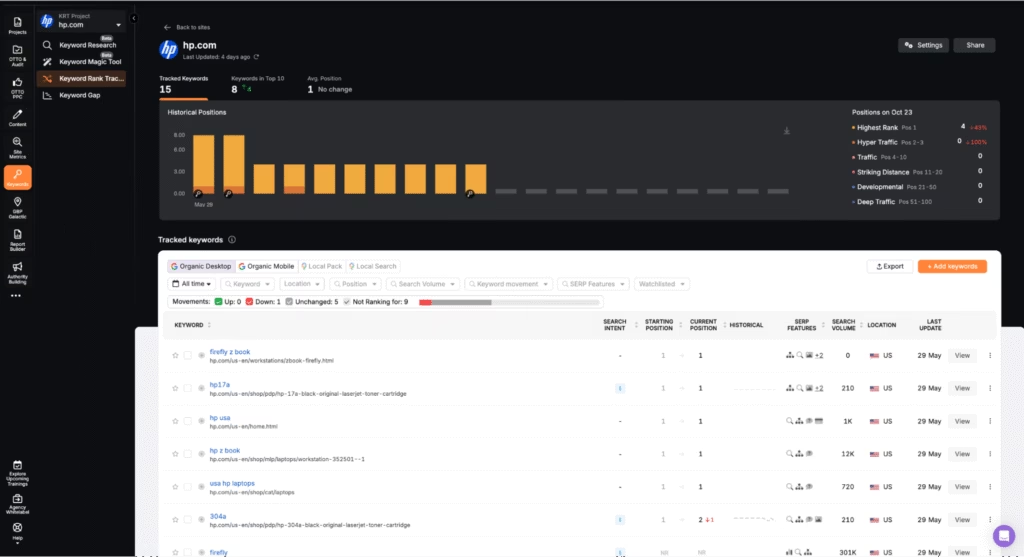
8. Maintain Communication
Maintaining communication fosters productive partnerships and ensures alignment between business objectives and SEO activities. Regular dialogue prevents misunderstandings and enables collaborative problem-solving.
Effective communication establishes clear channels, frequencies, and escalation procedures. Set expectations for response times, meeting schedules, and reporting formats. Designate primary contacts on both sides to streamline information flow and decision-making.
Communication best practices for SEO outsourcing are below.
- Schedule regular check-in calls or meetings to review progress.
- Establish preferred communication channels (email, project management tools, instant messaging).
- Create escalation procedures for urgent issues or concerns.
- Document all strategic decisions and direction changes.
- Provide timely feedback on deliverables and recommendations.
- Share business updates that might impact SEO strategies.
What Are the Types of SEO Services to Outsource?
The types of SEO services to outsource encompass specialized optimization activities that require specific expertise, tools, or time investment. Understanding available service types helps businesses to outsource search engine optimization services based on internal capabilities and strategic priorities.
The main types of SEO services to outsource are listed below.
- On-page SEO. On-page SEO services optimize individual web pages to improve search rankings through content enhancement, meta-tag optimization, header structuring, and internal linking strategies.
- Link Building for SEO. Link building services acquire high-quality backlinks from authoritative websites. Outsource link building to achieve backlinks through outreach, content marketing, digital PR, and relationship development, and boost domain authority.
- Technical SEO. Technical SEO services address website infrastructure issues, including site speed optimization, mobile responsiveness, crawlability improvements, and structured data implementation.
- Content SEO. Content SEO services create optimized content that targets specific keywords while providing value to users through blog posts, guides, product descriptions, and multimedia assets.
- Local SEO. Local SEO services optimize business visibility in geographic-specific searches through Google Business Profile management, citation building, and location-based content strategies.
- E-commerce SEO. Ecommerce SEO services specialize in optimizing online stores through product page optimization, category structuring, and shopping feed management.
- International SEO. International SEO services expand global reach through multilingual optimization, hreflang implementation, and country-specific targeting strategies.
- SEO Audits. SEO audit services provide comprehensive website analysis, identifying optimization opportunities, technical issues, and competitive gaps requiring attention.
Is Outsourcing SEO Projects Necessary?
Yes, outsourcing SEO projects is necessary when internal teams lack the expertise, tools, or time to manage optimization tasks at scale. Businesses outsource SEO work to achieve consistent rankings, meet content deadlines, and respond to algorithm changes faster than in-house teams can adapt.
Search engine optimization requires constant updates, including technical audits, on-page refinement, and link acquisition. SEO processes demand experience, software access, and full-time attention. Most businesses do not maintain dedicated SEO departments or content production pipelines. They outsource SEO work to partners who specialize in performance delivery, reporting, and campaign scaling.
Outsourcing becomes essential when businesses want to compete for high-value keywords, expand into new markets, or fix technical issues that block indexation. Without reliable SEO execution, websites lose traffic, visibility, and revenue potential. Delegating SEO work prevents internal bottlenecks and protects long-term search performance.
What Are the Pros and Cons of Outsourcing SEO Services?
The pros and cons of outsourcing SEO services reflect trade-offs between external expertise and internal control. Understanding the advantages and disadvantages of SEO services outsourcing enables informed decisions about outsourcing strategies.
Pros of Outsourcing SEO Services
The pros of SEO outsourcing provide compelling reasons for businesses to partner with external providers.
The main advantages of outsourcing SEO services are listed below.
- Increased expertise access. External SEO professionals bring technical specialization and cross-industry experience.
- Faster campaign execution. Outsourced teams apply established workflows that reduce ramp-up time and delivery delays.
- Broader tool and platform leverage. Providers use licensed SEO software unavailable to most small and mid-size businesses.
- Cost-effective scaling flexibility. Businesses avoid overhead tied to hiring, onboarding, and internal infrastructure.
- Focused internal operations. In-house teams prioritize product, customer success, and growth while SEO runs externally.
- Improved adaptability to algorithm changes. Agencies track SERP volatility and adjust strategies based on search engine updates.
- Greater scalability potential. Providers adjust resources based on seasonal shifts, campaign size, or market expansion needs.
- Structured performance-based reporting. Most providers include KPI tracking, ranking movement, and traffic analysis in regular reports.
Cons of Outsourcing SEO Services
The cons of SEO outsourcing present challenges requiring careful management.
The main disadvantages of outsourced SEO services are listed below.
- Control reduction. External management reduces direct oversight of SEO activities and strategic decisions.
- Communication challenges. Remote collaboration introduces potential miscommunications, delays, and alignment issues.
- Quality variability. Provider quality ranges significantly, with poor choices potentially damaging rankings and reputation.
- Hidden costs. Additional expenses for extra services, tools, or content creation might exceed initial budgets.
- Security concerns. Sharing website access and business information with external parties introduces data security risks.
- Dependency creation. Long-term outsourcing creates reliance on external providers for critical marketing functions.
- Cultural misalignment. External providers might not fully understand brand voice, values, or customer nuances.
What SEO Tools Are Used to Outsource SEO Projects?
The best tools for outsourcing SEO projects are the tools that streamline keyword research, site audits, content scoring, backlink acquisition, and client reporting. SEO tools support agencies and consultants who deliver SEO work at scale. Outsourcing teams rely on platforms that combine automation, accuracy, and integration across search visibility workflows.
The two most common categories of SEO tools used to outsource SEO projects include free Google tools for foundational tasks and all-in-one paid platforms like the Search Atlas SEO platform, with SEO tools for full-service execution.
Free tools from Google support foundational tasks. Google Search Console (GSC) tracks keyword visibility, indexing status, and technical errors. Google Analytics 4 (GA4) measures user behavior, bounce rates, and conversion funnels. Google Keyword Planner provides search volume ranges and commercial intent indicators for targeting. Google tools form the baseline for most outsourced SEO campaigns.
Search Atlas is designed to support SEO outsourcing at scale through a unified, automation-driven platform. The Search Atlas SEO platform enables agencies, consultants, and resellers to deliver technical audits, keyword research, content optimization, and backlink acquisition under a white-label framework. Every tool within the platform supports outsourcing workflows, from OTTO SEO for on-page automation to Site Auditor, Schema Generator, and Instant Indexing for full technical delivery.
Search Atlas includes tools built specifically for white-label SEO operations. The SEO Report Builder creates fully branded reports with automated performance tracking, while WILDFIRE accelerates link acquisition through a 2:1 exchange network of pre-vetted domains. Link Laboratory connects outsourced teams with guest posts and publisher opportunities, and the Topical Dominance tool allows agencies to position clients as authorities by mapping competitor content coverage and keyword gaps.
For agencies that outsource SEO delivery or scale client campaigns under NDA, Search Atlas provides the infrastructure, automation, and reporting necessary for a full-service White-Label SEO Software provider.
What Businesses Need SEO Outsourcing the Most?
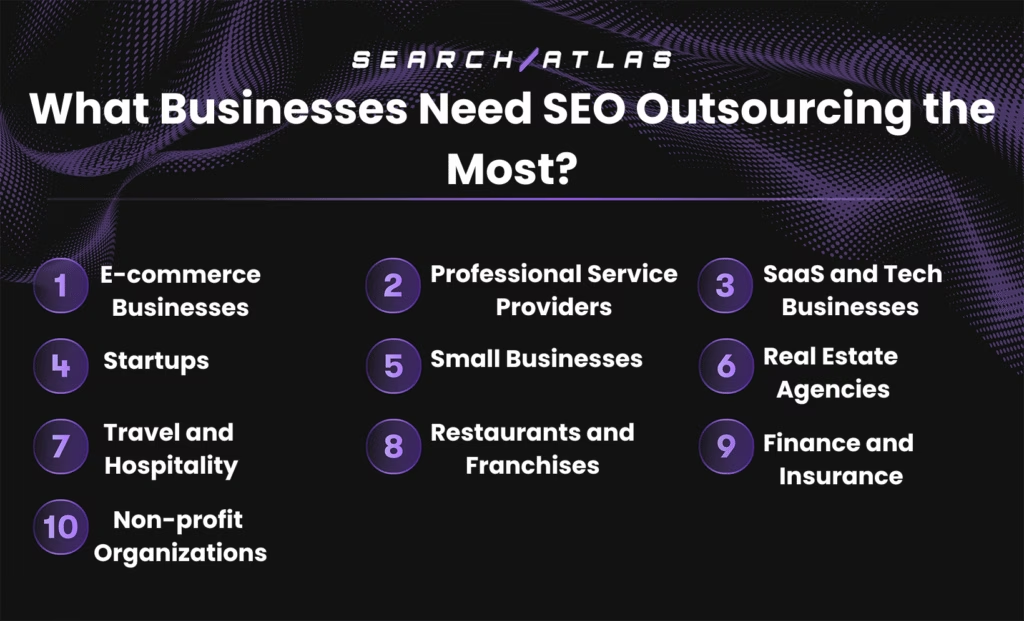
Businesses that need SEO outsourcing the most include those with limited internal resources, competitive market positions, or rapid growth objectives. Certain business types particularly benefit from external SEO expertise due to their unique challenges and opportunities.
The businesses that gain maximum value from SEO outsourcing are listed below.
- E-commerce businesses scale content, fix duplication, and optimize thousands of URLs across product categories. Most online retailers outsource ecommerce SEO to manage technical audits, link velocity, and schema deployment, especially in B2C SEO campaigns.
- Professional service providers such as legal, dental, and medical practices require review management, NAP consistency, and map pack visibility. These businesses outsource local SEO to improve regional performance and support geographic discovery in verticals like law firm SEO.
- SaaS and technology companies compete in high-difficulty keyword spaces and require a full-funnel SEO strategy. SaaS and tech companies outsource SaaS SEO to support long-form content, feature snippets, and demand capture.
- Startups focus on early traction, product validation, and limited headcount. Startup companies outsource SEO for startups to build foundational architecture and organic lead flow.
- Small businesses prioritize local visibility, branded queries, and resource efficiency. Owners outsource small business SEO to gain recognition and improve elements like mobile rankings and directory consistency.
- Real estate agencies need fast-loading listings, structured property data, and neighborhood-targeted keywords. Real estate firms often outsource local SEO to dominate geo-specific queries and improve visibility in real estate SEO use cases.
- Travel and hospitality companies operate in multiple languages and regions, with seasonal content cycles and complex international targeting. These brands outsource multilingual SEO to implement hreflang, localize landing pages, and structure geo-content effectively, which defines most travel SEO executions.
- Restaurants and franchises rely on visibility for mobile searches, proximity keywords, and menu indexing. These businesses outsource local SEO to improve map presence and cross-platform consistency, which supports objectives in restaurant SEO.
- Financial and insurance organizations need compliant content architecture, trustworthy schema, and competitive lead-generation assets. Finance and insurance companies outsource enterprise SEO to maintain visibility for competitive terms, a standard priority in SEO for financial services.
- Non-profit organizations require discoverability for campaigns, volunteer recruitment, and educational content. Non-profit teams outsource SEO to scale content efficiently and meet public service goals, which reflects priorities in SEO for non-profits.
What Is the Best SEO Outsourcing Company?
The best SEO outsourcing company is LinkGraph. LinkGraph is an SEO digital agency with over a decade of experience that delivers full-service SEO execution, including technical audits, content development, and white-hat link building. LinkGraph supports enterprise clients, SaaS brands, e-commerce stores, and local businesses through proprietary software and expert-led strategy.
LinkGraph stands out from other SEO outsourcing companies because it integrates campaign execution with in-house Search Atlas tools. Search Atlas stack includes the SEO Content Assistant for semantic writing, OTTO SEO for real-time AI optimization, GSC-integrated dashboards for live ranking visibility, and Link Laboratory for backlink intelligence. LinkGraph syndicates and amplifies content through Signal Genesys, its branded PR and authority-building platform.
Clients in the United States, India, and Dubai choose LinkGraph for its ability to scale SEO campaigns across markets and industries. Global reach, transparent reporting, and white-label capacity position LinkGraph as the top provider in the best SEO outsourcing companies sector.
Do SEO Outsourcing Agencies Manage Digital PR?
Yes, SEO outsourcing agencies often manage Digital PR as part of their off-page SEO and authority-building services. Digital PR includes press release distribution, brand mentions, editorial links, and media outreach campaigns. Digital PR tactics support SEO performance by generating backlinks, improving E-E-A-T signals, and increasing branded search volume.
Agencies that offer white-label SEO services integrate Digital PR into link-building workflows using tools for publisher outreach, content syndication, and journalist targeting. Trusted SEO outsourcing agencies like LinkGraph leverage the best press release distribution services to secure placements across news sites and blogs. Digital PR amplifies new product launches, acquisitions, and thought leadership content.
Is It Worth Starting an SEO Outsourcing Agency?
Yes, starting an SEO outsourcing agency is worth it when the agency offers scalable processes, high-value results, and vertical-specific expertise. The demand for outsourced SEO continues to grow across startups, SaaS, e-commerce, and service-based businesses.
An outsourced SEO agency becomes profitable when it offers technical SEO, content execution, and link building under fixed retainers. Agencies that use automation, fulfill white-label services and build industry-specific packages scale faster than independent consultants. Long-term profitability depends on client retention, operational efficiency, and productized service tiers. For detailed benchmarks and earnings potential, review the SEO agency profitability guides.
How Do I Become an Outsource SEO Reseller?
To become an outsourced SEO reseller, you need to partner with a white-label provider that delivers SEO outsourcing services on your behalf. SEO resellers act as intermediaries between clients and execution teams by packaging technical SEO, content, and link-building into branded deliverables.
The provider handles fulfillment, while the SEO reseller manages client communication, pricing, and reporting. If you want to be a successful SEO reseller, choose partners with scalable processes, transparent performance data, and vertical-specific experience.
To evaluate the right provider, compare each SEO outsourcing service based on turnaround time, tool integration, and reporting quality.
What Is the Difference Between In-House SEO and SEO Outsourcing?
In-house SEO refers to search engine optimization managed by internal team members who handle strategy, execution, and reporting. The in-house SEO model provides full control, brand familiarity, and cross-department collaboration. Businesses choose in-house SEO when they prioritize long-term content ownership, internal training, or close integration with product and marketing teams.
SEO outsourcing means hiring an external SEO company to handle part or all of the optimization process. The SEO outsourcing model supports scale, faster execution, and access to specialized talent. Businesses outsource SEO when they lack internal bandwidth, require technical expertise, or want to reduce overhead. External providers manage tasks like audits, keyword research, and link acquisition under a service contract.
In-house SEO maximizes internal alignment and brand continuity. SEO outsourcing maximizes output speed, resource efficiency, and campaign scalability.
What to Know About SEO Outsourcing Besides AI SEO?
SEO outsourcing and AI SEO work together when businesses want scalable execution supported by automation and human expertise. SEO service providers use AI tools to generate keyword clusters, optimize metadata, score content relevance, and detect ranking shifts across large domains. AI SEO reduces manual effort, improves accuracy, and accelerates content deployment timelines.
Businesses that outsource SEO benefit from providers who combine automation with expert oversight. AI SEO improves accuracy in content audits, SERP analysis, and topical gap identification, while SEO teams manage execution, prioritization, and strategic alignment.


